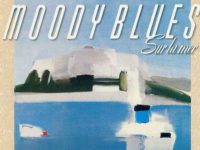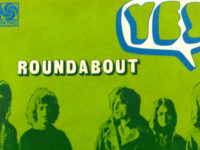There was always more to the Moody Blues than the thunderous orchestral sweep of “Nights in White Satin,” no matter the glories of that proto-prog triumph. Timeless Flight touches on almost all of them.
If you can’t spring for the LP-sized behemoth featuring 11 audio discs and six DVDs, there’s a thiftier — and still quite nifty — four-disc edition from Universal which covers a lot of the same ground, but at a fraction of the time and cash requirement.
This stream-lined Universal set features 70 hits, live updates and album tracks from between 1967-2003, but still takes in everything from the Moodies’ first tentative experiments with the Mellotron on their ’67 single “Love and Beauty” to the trippy pot-fueled dreamscape of “Tuesday Afternoon, from 1981’s new wave-sparked “Gemini Dream” to the synthesized grandeur of 1988’s “I Know You’re Out There Somewhere.”
In between, you’re reminded all over again just how many layers there are to this band. The Moody Blues could rock, as with the 1968 single “Ride My See Saw”; contemporize their own early sound, as on 1981’s “The Voice”; offer flinty protest, as with 1970’s hit “Question”; and transform into bonafide video stars, as with 1986’s “Your Wildest Dreams.” They went into space (or at least a cassette of both 1967’s Days of Future Passed and 1972’s Seventh Sojourn did) with shuttle commander Robert Gibson in the 1990s, and added their own fingerprints to the “War of the Worlds” legend (as heard here when frontman Justin Hayward takes on “Forever Autumn” from Jeff Wayne’s 1978 production).
They survived the expected ups and downs associated with such a lengthy career, including break ups and make ups, unjustified flops like 1983’s The Present, two broken toes (and a flute!) for Ray Thomas, a vocal cyst for Mike Pinder, and gastroentertis for John Lodge. They continue on today with out several key contributors, among them Denny Laine (who fronted the band before Hayward’s arrival), Pinder, successor keyboardist Patrick Moraz and Thomas. These days, drummer Graeme Edge is the only original member still with the Moody Blues.
Still, it seemed, there were just as many fortuitous moments.
Decca suggested they pair with an orchestra to redo Dvorak’s Ninth in order to show off the label’s new stereo technology; Hayward and Co. were able to convince staff producer Tony Clarke and arranger Peter Knight to take a crack at a new song cycle that would become the career-making Days of Future Passed instead. A decade later, the mix-down of an archival concert recording brought the Moodies back together after a four-year period of solo work. Then there was the hiring of the ex-Yes member Moraz, originally as a hired hand to fill in for the departed Pinder on the tour in support of 1978’s Octave. He’d help refocus the the group’s sound into a sleeker, more modern combination of prog and pop that would presuppose a number of 1980s successes — both for the Moody Blues and for other similarly retooled bands like Yes.
The four-disc edition of Timeless Flight still showcases the expected passel of rare and unreleased gems, including the delightful “Island” from an aborted 1973 album session and a previously unheard pair of tracks recorded in 1997 with the World Symphony Orchestra. You’ll find a number of solo items, including that underrated Hayward-Lodge side project the Blue Jays, and this notable gift for careful listeners: Original album mixes of four tracks from Days of Future Passed (including “Nights” and “Tuesday Afternoon”) are heard on CD for the first time.
The only quibble with this nicely edited version (as with the larger one) is that Timeless Flight ignores the Moody Blues’ initial chapter. They were founded, of course, not in 1967 but in the early 1960s — a period when the Laine-fronted band played in a tougher, R&B-soaked style highlighted by their U.S. Top 10 redo of Bessie Banks’ soulful “Go Now.” Highlights from that seminal era, so obviously different than the sound the group would eventually shift toward, would have fit nicely onto a stand-alone fifth disc.
- How Deep Cuts on ‘Music From Big Pink’ Underscore the Band’s Triumph - July 31, 2023
- How ‘Islands’ Signaled the Sad End of the Band’s Five-Man Edition - March 15, 2022
- The Band’s ‘Christmas Must Be Tonight’ Remains an Unjustly Overlooked Holiday Classic - December 25, 2016




